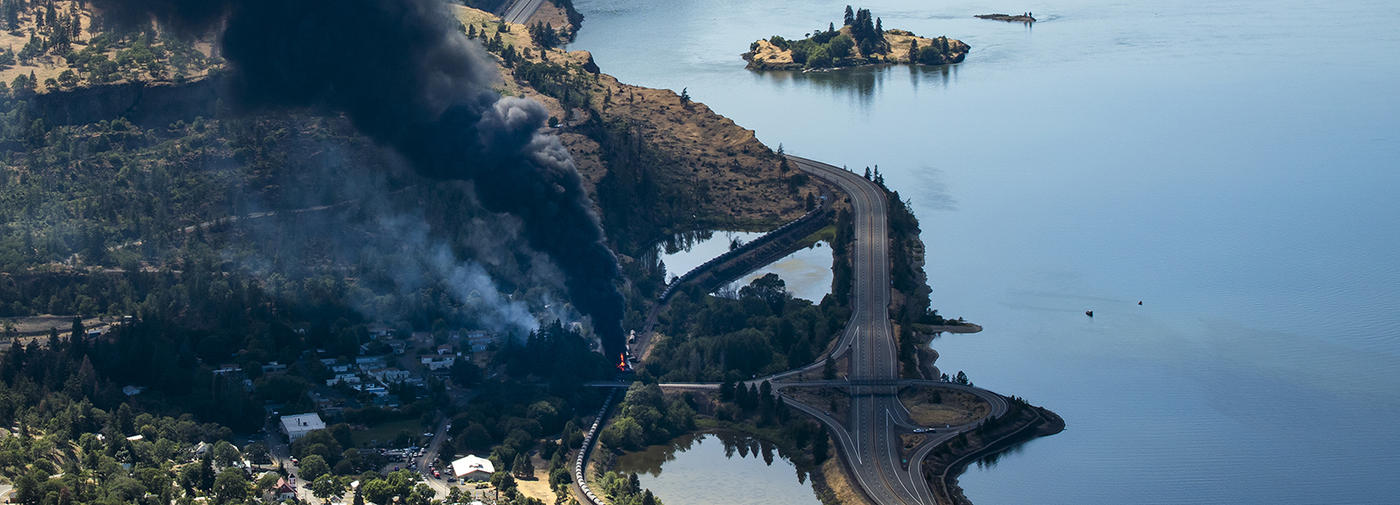Mosier Oil Train Derailment
Some of the worst fears about oil-by-rail in the Columbia Gorge came true...and it was no accident

A tower of smoke rises from the oil train derailment and fire at Mosier, OR, June 3, 2016. (photographer: Paloma Ayala)
On June 3, 2016, an event that officials and citizens in the Columbia River Gorge National Scenic Area had feared came to pass: A Union Pacific unit train carrying nearly three million gallons of oil derailed as it passed by the Oregon town of Mosier. Of the 96 supposedly safer tanker cars on the train, 16 derailed, spilling 42,000 gallons of oil. The volatile Bakken crude ignited, causing a fire that took 14 hours to extinguish and sending up a plume of smoke that could be seen for many miles around.
Fortunately, no one was killed or injured, but toxic smoke and ash contaminated Mosier and the Gorge, the Mosier water system was compromised, and oil spilled into the Columbia River. And this was far from a worst-case scenario: Had the high winds of a typical late spring day in the eastern Columbia Gorge been blowing, a much more catastrophic event would have occurred.“Those flames ignited a fire within us that won’t be extinguished until every community is safe from the threat of oil-by-rail.” – Mosier Mayor Arlene Burns
This was no accident, but rather the result of inadequate track maintenance by Union Pacific combined with simple mathematical probability: Highly flammable oil, hauled by heavy trains with tanker cars not designed to carry such hazardous material, is bound to yield derailments and fires at semi-regular intervals. Before Mosier, upward of a dozen such derailments had occurred in North America, including a horrific derailment and explosion in Lac-Mégantic, Quebec, in 2013 that killed 47 people and flattened part of the town’s downtown area. If Tesoro's proposed oil-by-rail terminal for the Port of Vancouver is built, it would be the largest such facility in the United States and result in four additional, fully loaded oil trains traveling through the Columbia Gorge every day. The mathematical probability of another Mosier-type event, or worse, another like at Lac-Mégantic, would rise significantly.For a community that was among the first to pass a resolution expressing strong concerns about the safety of oil-by-rail, June 3 only raised the stakes for Mosier, as well as other communities in the Gorge and throughout the Pacific Northwest, to stop oil-by-rail. It is long past time that we protect our children, communities, and resources from irresponsible, destructive exploitation by oil companies.
Take Action!
Ask your governor and members of Congress to ban oil-by-railMore About Mosier Derailment
- Nov. 3: Wasco County Commission Votes to Deny Rail Expansion Through Mosier
- Aug. 17: Mosier Pushes Back Against Rail Expansion
- Aug. 16: PRESS RELEASE: Experts Say Rail Expansion in Mosier, OR Could Double Rail Traffic Through Gorge
- Aug. 10: How Bad Could the Mosier Oil Spill Have Been?
- June 24: Washington Governor Calls for Oil Train Moratorium on Union Pacific
- June 23: PRESS RELEASE - Federal Report: Union Pacific’s Failure to Maintain Track Resulted in Mosier Oil Train Derailment
- June 22: Union Pacific resumes oil train traffic through Columbia River Gorge, postpones hearing on rail expansion in Mosier
- June 17: PRESS RELEASE: Mosier Oil Train Derailment Ignites "Mosier Voices"
- June 4: Worst Fears Realized for Mosier Residents With Train Wreck
- June 3: As Mosier Oil Train Derailment Unfolds, Union Pacific Works to Expand Oil-by-Rail in the Columbia Gorge


